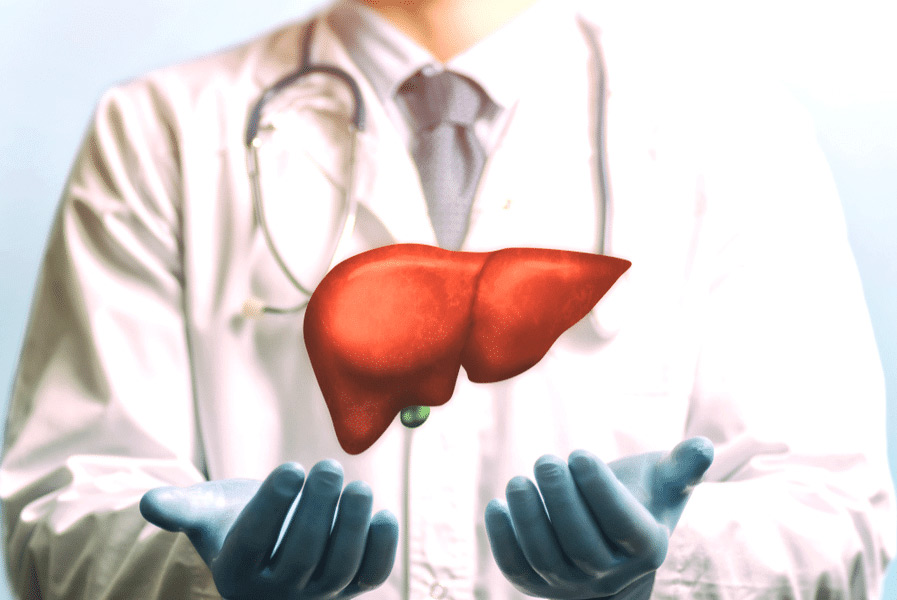
Liver Care
Medical Specialities / Liver Care
About the Liver

A significant internal body organ, located on the upper right of the abdomen. It assists in digestive processes and has regenerative properties.
Detoxify the blood that is circulating, produce bile to assist in digestion, regulate blood clotting, and many more.
Hepatitis A, B & C caused by viral infections, Cirrhosis of the liver, Alcoholic & non-Alcoholic fatty Liver disease are the most common
The Liver is a significant internal body organ that works 24 hours a day to ensure that the body remains healthy. Weighing in at a little more than one kilogram, it is the largest internal organ, as well as the largest gland of the body. It processes virtually everything one eats, drinks, breathes in or rubs on their skin. In fact, the liver performs over 500 functions that are vital to life.
It is located below our diaphragm, behind the right ribs, in close proximity to the gall bladder and the stomach. It is a firm, toned mass of fragile dark red tissue that is enveloped by the Glisson’s capsule, which protects it. Its tissues are irrigated by a complex network of blood vessels reaching deep inside its core. The two distinct systems of circulation are the portal system which brings blood to the liver from the intestines, and the systemic circulation that brings blood to the liver from the heart. It also has regenerative properties.
The Liver is constantly working, ensuring that the body functions normally. Functions of the Liver include, but are not limited to:
- Cleansing the blood: Metabolizing alcohol and other drugs and chemicals, neutralizing and destroying poisonous substances.
- Regulating supply of body fuel: Glucose and fat are the major fuels for the body. Liver produces, stores and supplies quick energy to keep one’s mind alert and body active. It also exports fat and glucose
- Manufactures essential body proteins involved in transporting substances in blood, clotting of blood, and providing resistance to infections.
- Regulates the balance of hormones, be it sex hormones, thyroid hormones, cortisone and other adrenal hormones.
- Regulates the body’s cholesterol: Producing cholesterol, excreting it and converting it to other essential substances.
- Regulates the supply of essential vitamins and minerals, including iron and copper.
- Produces bile that assists in eliminating the toxic substances from the body and aids in digestion.
- Makes cells that are required for immunity (from infections)
To maintain a healthy Liver, a balanced diet and regular exercise is of utmost importance. Alcohol consumption, Smoking must be avoided. As a precautionary measure, it is also advisable to receive a full dose of the Hepatitis vaccine.
Liver diseases have vague symptoms, which can easily be confused as belonging to any other disease. The symptoms include:
- Jaundice (yellowing of eyes)
- Accumulation of fluid in the belly (Ascites)
- Swelling of feet (Oedema)
- Blood Vomitus (Hematemesis)
- Getting tired easily
- Pain in the Abdomen
Some of the more Common Liver Diseases that people get afflicted with, are:
- Alcohol-Related Complications (Alcholic Hepatitis, Cirrhosis)
- Hepatitis A and E
- Hepatitis B
- Hepatitis C
- Liver Disease in Pregnancy
- Non-alcoholic Fatty Liver Disease (NAFLD)
- Non-alcoholic Steato Hepatitis (NASH)
- Cancer (both local and that which is carried from another part of the body by blood)
Liver Tests (LTS), often called Liver Function Tests, are blood tests that monitor the health of the Liver and the Bile ducts. Along with one’s history and physical examination, the Liver Tests guide the healthcare provider to diagnose and manage Liver disease, if any.
These tests measure the levels of certain enzymes and proteins in the blood, how well the liver is performing its functions, and measure enzymes that liver cells release in response to damage or diseases.
The most common Liver Tests are:
- Bilirubin test (direct and indirect) to ascertain jaundice and its type
- Proteins and Albumin test
- Enzymes Alanine Aminotransferase – ALT (previously called SGPT)
- Aspartate Aminotransferase – AST (previously called SGOT)
- Alkaline Phosphatase (Elevated levels of the first 2 enzymes indicate liver cellular damage; and Elevated levels of the last 2 enzymes indicate obstruction in the bile flow)
- Gamma Glutamyl Transferase (GGT)
- Prothrombin time and INR (shows synthetic function of the liver)
- Viral serology for Hepatitis B and C, Cytomegalo Virus, Epstein Barr Virus and HIV
- Immunoglobulin Study
- Ferritin
- Alpha Fetoprotein
- Biopsy of Liver tissue
The doctor also does a complete physical examination and checks for the liver, spleen, free fluid in the abdomen, obesity, lymph nodes, anemia and jaundice. The medical history may include questions regarding drugs & alcohol intake, tattoos, unprotected sex, occupation, history of diabetes, high lipids in blood and family history.
It is a diagnostic procedure used to obtain a small amount of liver tissue, which is then examined under a microscope to determine what is causing the liver disease, as well as the degree of fibrosis (scarring) of the liver.
The use of video endoscopy has greatly facilitated the management of all patients with chronic liver disease. Upper endoscopy plays a pivotal role in the diagnosis and management of oesophageal and gastric varices. Endoscopic ultrasound is increasingly being used to detect varices and in the staging of gastrointestinal tumors.
Endoscopic retrograde cholangio pancreatography (ERCP) plays an important role in the diagnosis of recurrent pyogenic cholangitis. Endoscopic sphincterotomy is a useful form of treatment. Laparoscopy, with the aid of ultrasound and biopsy is helpful in staging chronic liver disease, identifying focal lesions, and diagnosing peritoneal disease.
When one’s Liver no longer functions adequately enough to keep them alive, or Liver disease has progressed onto higher stages and one’s liver is damaged beyond repair, then Liver transplant is recommended.
It is a surgical procedure performed to remove part of a diseased or injured liver and replace it with a whole or a portion of a healthy liver from another person (dead or alive), called the donor. Since the liver has regenerative properties, a transplanted segment can grow to normal size within a matter of few weeks.
The new Liver can be from two sources:
- Living Donors: from one’s own family, or someone who is blood group compatible. It is called Living Donor Liver Transplant (LDLT).
- Deceased Donors: from a brain-dead person whose family has agreed for donation. It is called Deceased Donor Liver Transplant (DDLT).
- The transplanted Liver then continues to function in the new body – the host body – under cover of immuno-suppressants.
Evaluation will include assessment of your:
- Alcohol related Liver diseases
- Chronic Hepatitis, including hepatitis B and Hepatitis C. These Hepatitis predominate as the cause of liver transplant in developed countries.
- Autoimmune Hepatitis Disease caused by abnormality of the immune system
- NASH, or Non-alcoholic Steatohepatitis, a disease caused by buildup of fat in the liver
- Some genetic conditions, including Wilson disease, where dangerous levels of copper build up in the liver, and Hemochromatosis where iron builds up in the liver
- Vessel Diseases - Budd Chiari Syndrome
- Bile duct Diseases - Primary biliary cholangitis, Primary sclerosing cholangitis, and biliary atresia
- Primary liver cancer, meaning cancers that originate in the liver, such as hepatocellular carcinoma, is amenable to liver transplant. Unfortunately, in most cases, individuals are diagnosed late, making transplant impossible.
For a patient to be considered for Liver Transplant, the first step is a referral for the same by their Liver physician / GI physician / Medical Gastroenterologist. Then, the patient is evaluated to see if they are a suitable candidate. The evaluation includes assessing the patient’s:
- Liver disease and other conditions they may have
- Mental and emotional health
- Other vital metabolic support systems
- Ability to adhere to the complex medical regimen required after transplant
- Likelihood of surviving the transplant surgery
Testing is an integral part of the Evaluation. Usual testing includes:
- Physical exam
- Detailed medical history
- Psychological and social evaluation
- Diagnostic tests to evaluate the status of heart, lung and other organs
- Imaging studies, such as CT scans and ultrasound, to assess the liver and blood flow through various vessels
- Multiple blood tests to determine blood type, kidney and liver function, check for other infectious and/or inherited diseases
- HIV, Hepatitis, drug and alcohol screening
Surgery for a liver transplant is challenging, and typically lasts 6 to 10 hours. During the operation, the surgeons will remove the injured or diseased liver and replace it with the donor liver, and place several tubes in the patient’s body to assist it in doing specific tasks throughout the procedure, and for a few days after it. The tubes include a catheter to remove urine from the bladder, intravenous lines to administer fluids and medications, a breathing tube, and other tubes to drain blood and fluid from the abdomen.
The patient will then be moved to a specially constructed intensive care unit for a couple days after the surgery. Later, they will be transferred to a standard room while being closely monitored. The length of hospital stay will depend on the patient’s conditions, and whether or not any complications arise.
The two main risks after Liver Transplant are Infection, and Rejection of the new Liver.
The body’s immune system cannot distinguish between the transplanted liver and unwanted invaders, and thus tries to attack or reject the new liver. To prevent rejection, transplant patients are given anti-rejection medication - immunosuppressants. They are drugs that suppress the immune system to stop possibility of rejection of new Liver.
By suppressing the immune system, the body becomes more susceptible to infections. This problem, however, can easily be resolved by administering other drugs, or it simply lessens as time passes.
Rejection of the Liver does not always have noticeable symptoms. Some of the more common signs of rejection are:
- Fever
- Headache
- Fatigue
- Nausea
- Loss of appetite
- Itchy skin (pruritus)
- Dark-colored urine
- Jaundice (a yellowing of the skin and whites of the eyes)
- Abdominal tenderness or swelling
Any person from the patient’s family (1st degree relatives- spouse, siblings, parents, children/ 2nd degree relatives- all others), provided they are blood group compatible, can become a Living donor for the patient.
Living Donors are assessed in 4 stages to rule out Liver or other Systemic diseases. This helps in deciding the suitability of the living donor.
With the present availability and expertise in surgery and anaesthesia, Liver Transplant surgery is very safe for the Living Donor. The risk of surgery for the donor is a meagre 0.2 to 0.5 %.
At Zydus Hospitals, Ahmedabad, we provide end to end Liver care solutions by offering services from Clinical Assessment, Disease Detection, to Disease Management.
We also have a dedicated team of Gastroenterologists, Liver and Hepatobiliary Transplant Surgeons, Transplant Anaesthetists, Transplant Dietary Specialists, and an experienced team of co-ordinators to take care of the patient’s every need.



